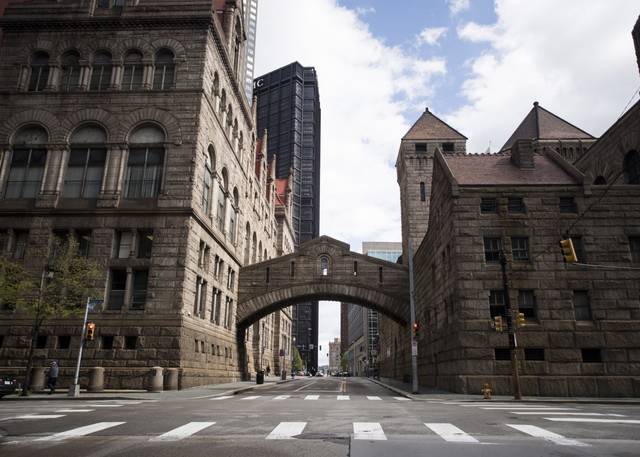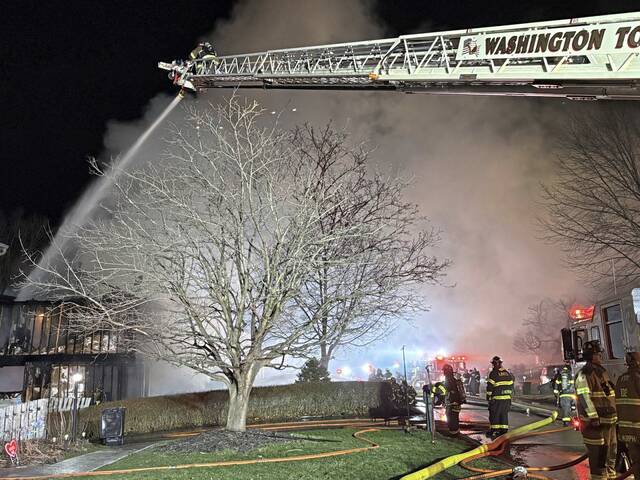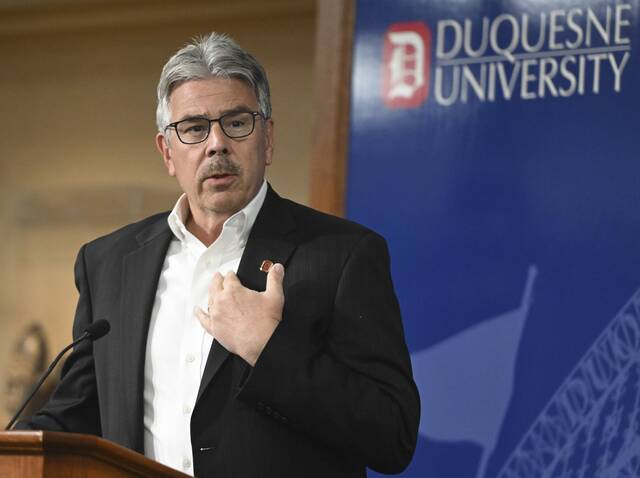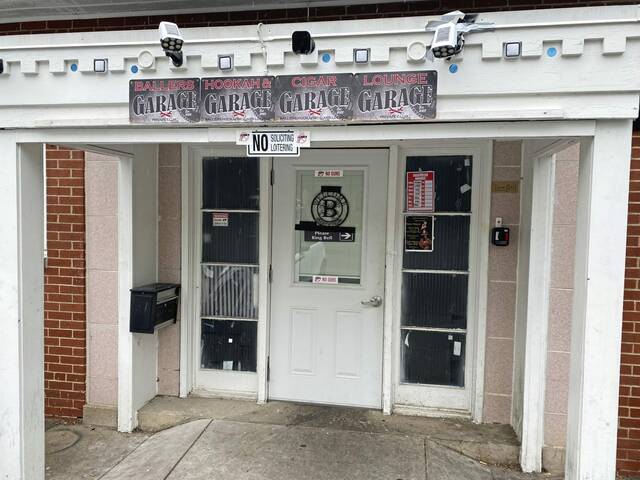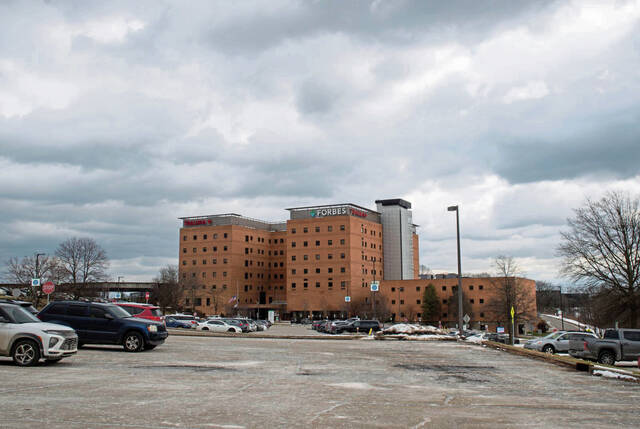Seven months after the Allegheny County Courthouse shut down because of the covid-19 pandemic, criminal jury trials are about to start again with masks and plexiglass and social distancing — to the chagrin of many of the attorneys who practice there.
Although those lawyers appreciate the steps being taken, some of the safety measures being implemented have them concerned: defendants wearing masks; attorneys not being able to connect with potential jurors during selection; and lawyers not being able to converse quietly with their clients at counsel table.
That doesn’t even take into account their concerns about who might turn up for jury selection and the lawyers’ fears of contracting the virus. Three assistant district attorneys were sickened in June, including one who died.
“You’re deathly afraid,” said attorney Thomas N. Farrell, who chairs the criminal section of the Allegheny County Bar Association. “You cannot simply turn it off and say it can’t happen to another person.
“It already happened to one of our friends.”
Longtime Assistant District Attorney Russ Broman died Aug. 11, more than a month after he contracted covid-19, he believed, from being exposed to a court reporter who had tested positive in a fifth-floor courtroom.
Two other ADAs also tested positive. One of them, Greg Stein, did not experience serious symptoms, but the other, Ted Dutkowski, was hospitalized for 11 days.
At the time, the courthouse shifted to primarily remote work — including plea hearings and non-jury trials. Some judges continued working mainly from the courthouse.
Then, on Sept. 28, the courtroom of Common Pleas Judge Anthony M. Mariani, one of those who urged attorneys to appear in person before him, was shut down for two weeks. A person there tested positive. Court administrator Chris Connors said he could not reveal who that individual was.
Bret Grote, the legal director at the Abolitionist Law Center, questioned the reasons for resuming trials now when Allegheny County and the rest of Pennsylvania are seeing an uptick in covid-19 cases.
“To attempt to continue business as usual with some pandemic safeguards is ill-advised and shows a disturbing commitment to caging and punishment that is stronger than their commitment to public health,” Grote said.
But court administrators said they consulted with the Allegheny County Health Department and will follow recommended guidelines from the Centers for Disease Control and Prevention.
To ensure safety protocols — particularly social distancing — jury selection for both the civil and criminal divisions will be held at the David L. Lawrence Convention Center, Downtown.
Metal detectors will be in place at all of the facilities, and covid-19 protocols, such as temperature checks and screening questions, will be administered.
Masks will be required for everyone entering the court facilities; there will be hand sanitizing stations throughout; and members of the public or media who want to observe trials will have to do so from separate rooms via cameras to limit the number of people in each courtroom.
Once juries are selected, civil trials will be heard in the convention center. Criminal trials will be held in only three main locations — a large courtroom of the third floor of the Allegheny County Courthouse; in the Gold Room of the courthouse, which is used for County Council and public hearings; or in a large courtroom on the seventh floor of the City-County Building.
In those rooms, every person must wear a mask; plexiglass partitions will separate witnesses from court staff; and jurors will sit far apart from one another in the gallery, not the jury box, Connors said.
In explaining her order to resume criminal trials, President Judge Kim Berkeley Clark said defendants in custody, as well as alleged victims and their families, have had to wait for months for justice.
“We must begin to bring resolution and closure to these cases in the safest manner possible,” she said.
University of Pittsburgh law professor David A. Harris said the procedures in place will definitely not be ideal, but that doesn’t mean there should be further delay.
“We can’t let the perfect be the enemy of the good, because the perfect ain’t coming back for a while,” he said.
Prioritizing cases
Grote appreciates that defense attorneys and court administration are concerned about the speedy-trial rights of criminal defendants — many of whom have waited months for their cases to go to court. If trials are being held for those most serious cases and those who have been in custody the longest, he believes they should go on.
Criminal Court Administrative Judge Jill E. Rangos said that, ideally, that is exactly who would get first priority in jury trials.
Over the last several weeks, she said, individual judges have put together lists of all of the cases scheduled for jury trials before them.
Included on the list are defendant names; the lead, most serious charge against them; whether the defendant is incarcerated; and if so, for how long.
Those judges then were asked to have a status conference on each case to figure out which ones are ready to go. Once that was completed, the list was forwarded to Rangos and court staff.
In many instances, once the parties realized they were in line for trial to begin soon, they worked the cases out, she said.
Because of that, the criminal division was able to reduce a single-spaced, two-page spreadsheet of cases ready for trial, down to a list of cases that will be able to be tried in the next two weeks, she said.
Priority is being given to people who have been held in jail the longest. But, Rangos noted, “All cases are important to the people who are involved.”
‘No perfect answer’
Farrell understands how cases are being prioritized and why. He has clients who have been incarcerated for a long time. But he also worries about potential prejudice they may face by the kind of people who willingly appear for jury selection during a pandemic and for having to wear a mask at trial.
Both he and Grote questioned if there will be a higher percentage of supporters for President Trump showing up for jury selection.
“It will be the right-wing people, law-enforcement people who don’t care about getting covid,” Farrell said.
Grote said he expects there will be fewer older people, fewer people of color, fewer people who are medically vulnerable and fewer people from the working class.
Connors said that in sending out juror summons, more than twice the normal number were sent, and any person asking for a deferral because of covid-19 will be given one.
As far as ensuring a fair panel is selected, Connors noted, there will still be individual juror questioning.
Farrell wondered how he will form a connection with jurors while both he and they are wearing masks and are socially distanced.
He also questioned how he might talk to his client at counsel table without violating CDC guidelines. Connors said defendants will have to write notes to their attorneys, and if necessary the court will take a recess.
Further, there is also the idea of jurors judging credibility when defendants and witnesses are potentially masked.
“Imagine having to try to assess if people are telling the truth,” Harris said. “We tell jurors all of the time, you are the judges of the facts and the credibility of the witnesses.”
But a huge part of that, he noted, is reading someone’s facial expressions.
While Rangos understands the concern over masks, she pointed out that judges and jurors will be wearing them, too.
“It’s all been happening that way for a long time,” she said. “It’s not like this is new.”
Connors, too, said the court will have clear masks and face shields available when necessary, and witnesses will be behind plexiglass, which could allow for removing their masks.
Dr. Amesh Adalja, a senior scholar in infectious disease at the Johns Hopkins University Center for Health Security, said that the steps being taken by court administration ought to limit the chances of an outbreak in the facilities.
“This is something we have to figure out how to do,” said Adalja, who practices in Pittsburgh. “We can’t have this core function of government be disrupted for so long without having negative consequences.”
Farrell disagrees.
“The system is rushing it,” he said. “It just doesn’t add up that we’re all going to be safe.”
Harris said there is the possibility of traps and failures.
“And yet, we just have to do something, because you have to keep speedy-trial rights protected,” he said. “There is no perfect answer.”


